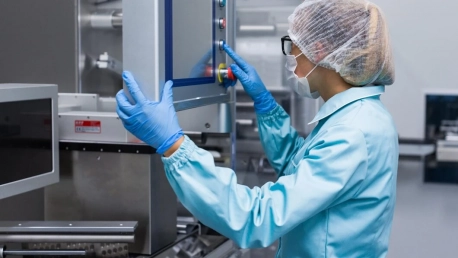Upstream bioprocessing is pivotal in biomanufacturing, where cellular systems produce vital therapeutic proteins and biological products. This field is experiencing a surge of innovative methods in response to the increased global demand for biopharmaceuticals driven by rising health concerns. These advancements are revolutionizing this initial stage of biopharma production, with new technologies and strategic improvements set to significantly alter its future landscape. As these changes unfold, they promise to enhance the efficiency and output of biopharma products, ensuring that the industry continues to meet the pressing health needs of people worldwide. This wave of change underscores the dynamic nature and growth potential of upstream bioprocessing in the biopharmaceutical sector.
The Surge in Single-Use Bioprocessing Systems
As an increasing number of biomanufacturers invest in single-use bioprocessing systems, the industry witnesses a pivotal shift toward more efficient and flexible production capabilities. These systems, featuring single-use bioreactors and disposables, have become instrumental in the industry’s efforts to mitigate the risks of cross-contamination, ramp up operational flexibility, speed up product changeovers, and alleviate the fiscal burdens of large-scale manufacturing operations. The pronounced expansion of single-use technologies is set to significantly fuel the growth of the upstream bioprocessing market, offering an agile alternative to traditional manufacturing paradigms.Evidently, the cost-effectivity and time-saving attributes of single-use systems are transforming the face of upstream bioprocessing. With their propensity for scalability and minimized downtime, these systems encourage innovation, enabling small and medium-sized biopharmaceutical firms to enter the market with reduced overheads and capital expenses. This democratization of bioprocessing has broad implications for the availability and variety of therapeutic products, ensuring a consistent march toward better patient care and more responsive health solutions.
Integration of Process Analytical Technology
Process Analytical Technology (PAT) has revolutionized upstream bioprocessing in the biopharmaceutical industry. It provides a system for precise control and consistent monitoring, which is critical for maintaining high-quality standards in the complex biopharmaceutical production process. PAT utilizes cutting-edge sensors and analytical methods to offer real-time data on critical process parameters, enabling quick adjustments that guarantee the final products adhere to strict regulatory requirements.This integration of PAT in bioprocessing aligns with the industry’s dedication to quality and efficiency. It enhances the production process, reducing deviations, and increasing the yield of therapeutic products. Regulatory agencies like the FDA and EMA advocate for PAT’s inclusion, indicating its fundamental role in optimizing biopharmaceutical production while aligning with safety and effectiveness standards.
The Dominance of Monoclonal Antibodies
Monoclonal antibodies (mAbs) stand tall within the biopharmaceutical sector as a driving force in the therapeutic market. Their rising importance is propelled by an ever-increasing need for specialized treatments targeting specific medical concerns such as cancer, autoimmune diseases, and infectious pathogens. The production of these potent mAbs rests upon intricate upstream bioprocessing technologies that meticulously leverage the advancements in genetic engineering and molecular biology, ensuring high fidelity in function and therapeutic impact.The notable CAGR observed in the mAb segment is not simply a testament to their clinical value but also an indicator of the strenuous development efforts required to produce these biological powerhouses. The resulting high-quality mAbs are proof that sophisticated upstream processes are non-negotiable in generating effective biologics. As the prevalence of complex diseases rises, the biopharmaceutical industry’s commitment to enhancing mAb production through refined upstream processes becomes ever more crucial.
The Impact of Industry Leaders and Strategic Movements
The competitive landscape of upstream bioprocessing is being sculpted by the diligent endeavors of industry forerunners. Their groundbreaking contributions through strategic alliances, mergers, and aggressive expansion plans are charting the future course for the industry. Pioneering companies in the sector, through considerable investment and focus on innovative bioprocessing technologies, are spearheading the development of advanced solutions to meet the increasing complexities of biopharmaceutical manufacturing.These major players are not only enhancing their own capacities but are also setting the stage for the entire industry to follow suit. Through their leadership and innovation, they are navigating the biopharmaceutical sector toward a future where robust, cutting-edge upstream bioprocessing is the norm. Their pivotal role in the sector underlines the essential nature of corporate strategy and investment in driving both technological advancement and market growth in the realm of biomanufacturing.
Aligning with Precision Medicine and Patient-Specific Therapies
In the arena of upstream bioprocessing, there is a discernible shift toward alignment with the principles of precision medicine and the provision of patient-specific therapies. This evolution is not only characterized by a demand for individualized treatments but is also mirrored in the technological progress—perfusion cell culture techniques, sophisticated bioreactors, and highly productive cell lines are testament to this progress. The deliberate strategy to accommodate personalized treatments is steering the industry toward an anticipated future, where biologics are not only effective but also tailored to individual patient needs.The article accentuates the imperative for industry players to comprehend and address the intricacies of the biologics production process in the context of a healthcare environment focused on precision and customization. Meeting the needs of personalized medicine requires not just innovation in product development but also in manufacturing processes, a challenge that industry leaders are enthusiastically embracing. The transition toward personalized biomanufacturing is thus not just a trend but a reflection of the underlying shifts in healthcare demands and biopharmaceutical strategies.
Meeting Healthcare Challenges with Advanced Bioprocessing
In the face of a rapidly changing healthcare environment, the biopharmaceutical industry relentlessly strives to provide safe, effective treatments through the use of cutting-edge bioprocessing technologies. These advanced methods are essential for the consistent production of high-quality biologics, adapting swiftly to new technologies and evolving patient needs. The industry’s resilience and flexibility are critical in continuing to supply essential biologics to an expanding, diverse patient base worldwide.Despite complex challenges from fluctuating demand and technological shifts, the upstream bioprocessing market stands strong. Biopharmaceutical companies are strategically positioning themselves with investments in modern technologies, signaling their preparedness to meet future health challenges. These innovations and expanded manufacturing capabilities underscore the industry’s commitment to improving health outcomes globally through providing crucial biologics.









